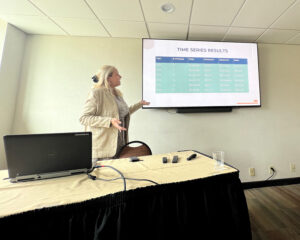
Allison Foster
Invasive species pose a significant and growing challenge globally with profound ecological, economic and public health consequences. In the United States alone, the annual cost of mitigating invasive species ranges between $26 billion and $120 billion. These species disrupt agriculture, threaten biodiversity and compromise both human and animal health infrastructure. Despite the widespread recognition of these threats, the management of invasive species varies significantly across states, particularly in terms of funding and reporting practices.

Kudzu, a fast-growing vine that has spread across the southeastern U.S. can grow up to a foot a day.
Allison Foster, a former undergraduate research fellow in wildlife biology and conservation at Auburn University and a former graduate student at the University of Maine, has dedicated much of her academic career to exploring the disparities in state-level funding for invasive species management.
Exploring the disparities in state funding
Working alongside Christopher Lepczyk, the Alumni Professor of wildlife biology and conservation in the Auburn College of Forestry, Wildlife and Environment (CFWE), Foster’s research examined how state natural resource agencies allocate funds to manage invasive species and highlighted the challenges posed by the lack of standardized expenditure tracking. Her research was recently published in Biological Invasions, a peer-reviewed journal focusing on the patterns and processes of biological invasions in terrestrial, freshwater and marine ecosystems.
While invasive species management is recognized as a critical need, discrepancies in how states report and allocate funding make it difficult to assess the effectiveness of these efforts or coordinate strategies nationally. A report by the U.S. General Accounting Office (GAO) in 2000 highlighted similar discrepancies in state spending on invasive species. Since then, little progress has been made to address these inconsistencies. Foster’s research sought to update and expand on this analysis, revealing that gaps in funding and reporting have persisted for decades.

Allison Foster presents an oral research presentation at the International Association of Society and Natural Resources annual meeting in Portland, Maine.
Foster’s role in research
Foster’s involvement in the research began when she joined the project as an undergraduate researcher after Lepczyk introduced her to research opportunities in his lab and encouraged her to pursue an undergraduate research fellowship.
As part of the project developed by Foster and Lepczyk, she surveyed state natural resource agencies to gather data on invasive species management expenditures invested over the past five years. During the six months dedicated to the research, Foster discovered significant differences in how states recorded management costs.
“Many states did not have records for more than a single year, and often they were directed to many different personnel,” Foster noted. “This inconsistency underscored the challenges in evaluating and comparing spending across states.”
The need for standardized accounting practices
As Foster and Lepczyk continued their research, they emphasized the importance of standardized accounting practices for managing invasive species. She observed that the variation in how states organized their expenditure data often led to poorly organized central accounting practices. Foster found that if natural resource agencies supported detailed and standardized management records, states could more effectively and efficiently allocate resources toward invasive species control.
Their research suggests that by adopting more standardized practices, states could improve transparency in how funds are spent and allow for better coordination of invasive species management efforts at the national level. However, while the research offers a clear framework, the successful implementation of these recommendations will require collaborative efforts across states that are vital to coordinating strategic actions.
Although Foster and Lepczyk hope that their findings will raise awareness about the need for standardized accounting practices, they recognize that the translation of research into practice is complex. Policy changes, structural reforms and collaboration across state and federal agencies will be necessary to overcome barriers to implementation.
Mentorship and professional development
Much of Foster’s success is credited to the mentorship she received from Lepczyk throughout the research process.
“Dr. Lepczyk showed up as a mentor and we stayed in regular contact to work on the paper, and he was understanding and made sure that we were on the same page through consistent communication,” Foster said, “As an undergraduate, there’s a lot you feel you don’t know, and his mentorship style was approachable and allowed me to understand the publishing process.”
Foster capitalized on the opportunity to do undergraduate research and encourages other students to do so.
“Undergraduate research is an amazing opportunity to gain skills and learn more about something you’re passionate about,” Foster said. “Talking to professors about undergraduate research and seeking a mentor is important for professional development. You never know unless you try. Being an undergraduate research fellow really helped me to understand what research entails and become more resilient in the face of challenges, whether it be addressing reviewer comments from a journal or figuring out the correct statistical coding for a graph.”
Collaboration and future implications
Foster’s research on invasive species management was conducted in collaboration with Lepczyk and other experts, including Daniel Rubinoff, a professor at the University of Hawaii, and Jean E. Fantle-Lepczyk, a CFWE assistant research professor of wildlife ecology and conservation. The team has presented their findings at national and international conferences, aiming to raise awareness about the need for better data tracking and coordination of invasive species management.
While the research provides a valuable starting point for understanding the gaps in state funding and reporting practices, its success in bringing about change will depend on continued collaboration and advocacy. Implementing standardized accounting practices will require further studies to test the recommendations in real-world contexts and a commitment from state agencies, lawmakers and other stakeholders to prioritize these efforts.
By bridging the gap between research and practical policy recommendations, Foster has demonstrated a unique ability to tackle complex environmental challenges. Her work on standardized accounting practices is poised to improve how states manage invasive species, and her dedication to advancing scientific knowledge will continue to drive positive change.









